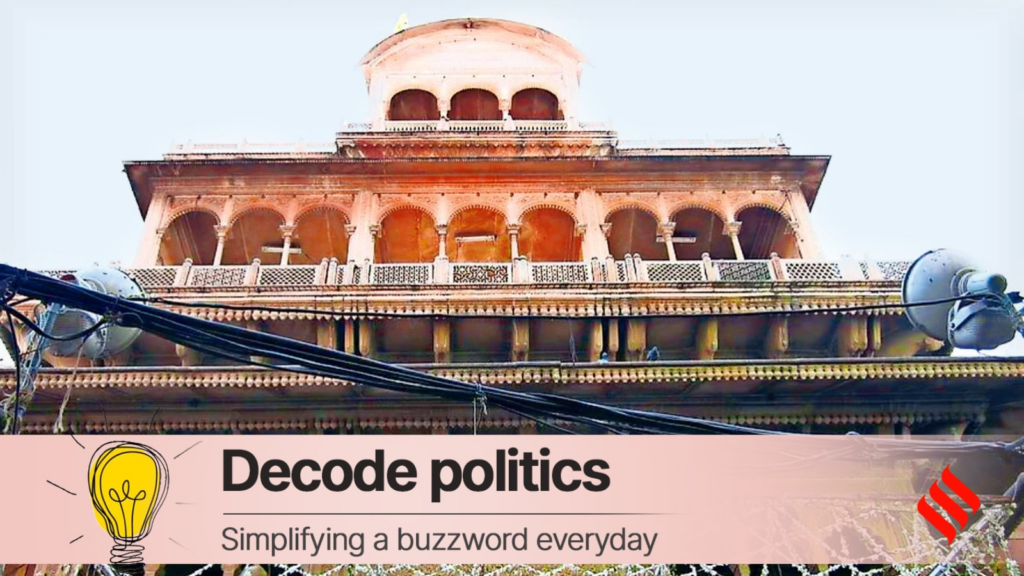The Yogi Adityanath government Wednesday introduced the Uttar Pradesh Shri Banke Bihariji Temple Trust Bill, 2025, for the running of the famous temple in Vrindavan, Mathura, in the Assembly.
It replaces a May 26 ordinance, which has been challenged in the Supreme Court for allegedly encroaching on temple funds. Incidentally, the BJP has traditionally opposed “interference” of the government in the running of temples.
* What reasons has the Adityanath government cited for the Bill?
Citing a 2022 stampede at the temple which left two people dead and seven injured, the Adityanath government has said that the Bill will ensure better crowd management and amenities at the Banke Bihari temple in Vridanvan of Mathura district, where lakhs of devotees visit annually.
“The Banke Bihari Temple is spread across approximately 870 square meters, of which around 365 square meters are used as a viewing courtyard. Due to the extremely narrow access route… devotees and visitors face severe inconvenience. The 2022 incident has highlighted the urgent need for efficient crowd management for the devotees visiting the temple,” the statement of reasons of the Bill states.
* Why is the Banke Bihari corridor project in court?
After Prime Minister Narendra Modi inaugurated the Kashi Vishwanath corridor in Varanasi on February 14, 2022, the Adityanath regime shifted its focus to the Banke Bihari temple in Vrindavan.
However, the government’s move to use temple funds to acquire five acres for a project similar to the Kashi Vishwanath corridor ran into legal trouble after the temple’s community of caretakers or sevayats approached the Allahabad High Court against it. The court last year passed an order denying permission to the government to use temple funds for the project.
The government then moved the Supreme Court against the High Court order. In May, the top court gave its go-ahead for the project, allowing the government to use temple funds to acquire land for the project.
The government later passed an ordinance to establish the Shri Banke Bihari Ji Mandir Nyas Trust, which was cleared by Governor Anandiben Patel.
After the temple sought a review of the Supreme Court order, the top court earlier this month formed an interim 14-member committee, headed by retired Allahabad High Court judge Justice Ashok Kumar, to oversee the daily affairs of the temple.
The apex court also modified its May order deleting portions which permitted the state government to acquire land with temple funds, and observed that it committed an error by passing the order without hearing the Goswami priest community’s side.
* What provisions does the Bill have?
Aimed at all-round development and management of the temple area including religious, cultural, spiritual and establishment-related aspects, the Bill provides for the constitution of a Shri Banke Bihariji Temple Trust.
While the Bill also proposes to ensure “uninterrupted continuity” of the rituals of the temple without “change of customs and traditions”, it maintains that it would not “prevent” the Trust from fixing darshan timings, appointing priests, fixing their salaries, compensations and emoluments, and take any measure to ensure safety of pilgrims and visitors.
According to the Bill, the Trust will be the custodian of “all money, assets, deposits, donations and jewels” of the temple, and this would be achieved through proper “book-keeping and maintenance of records”.
* What would be the composition of the Trust?
The trustees will be of two kinds – nominated and ex-officio.
The 11 nominated trustees, who will be picked by the state government, will include three “eminent persons” like seers, saints, gurus, scholars, Vaishnavite swamis, etc so will three more “eminent persons from other traditions or orders of Sanatana Dharma”.
Scholars, educationists, academics, entrepreneurs, professionals would occupy three more spots.
Two members of the temple’s Goswami community – one representing the Raj Bhog Sevayats and another representing the Shayan Bhog Sevayats – will also be a part of the Trust. The nominated trustees would have a tenure of three years.
The Bill also proposes a maximum of seven ex-officio members, who would be trustees “by virtue of their office”. They would include the district magistrate, senior superintendent of police, municipal commissioner of Mathura district, Chief Executive Officer (CEO) of the Uttar Pradesh Braj Teerth Vikas Parishad, an officer from the Religious Endowments Department and the CEO of the Banke Bihari Temple Trust.
The Bill clarifies that all trustees would be Hindus and subscribe to Sanatana Dharma. “No person other than Hindus shall be appointed as a nominated or ex-officio trustee,” the Bill states. It also provides for the appointment of a junior officer as an ex-officio member if a person chosen “does not belong to Sanatana Dharma, does not identify as a Hindu, or expresses his inability to discharge duties in the Trust”.
* What other powers will the Trust have?
The Bill empowers the Trust to manage all movable and immovable properties of the temple and settle disputes with regard to claims made on the deity, temple or the land through negotiations or any other means “it deems fit”.
Calling the proposed Trust an autonomous body, the government said it would be constituted to “preserve and formalise existing traditions” and ensure “financial transparency”. “The purpose of the Trust is not to take over assets or properties of the temple. Instead, it is to merely ensure that financial transparency is maintained,” the government said.

